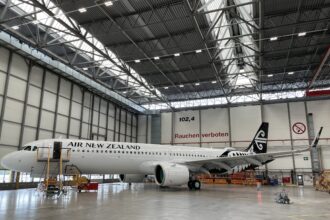They were once destined for landfill. Now they’re keeping smoke alarms running, powering toys and helping schools across South Auckland.
Thousands of batteries removed from passengers’ checked luggage at Auckland Airport are being donated to local charities instead of thrown away.
With travellers carrying more gadgets than ever, Aviation Security removes an average of 470 batteries a day from checked bags, according to Civil Aviation Authority (CAA) figures for July 2024 to June 2025.
Unopened packets of batteries are now being set aside through a partnership between Auckland Airport and Aviation Security. Around 145kg are donated each month, mostly AA and AAA batteries, adding up to about 95,000 batteries since the scheme began in August 2024.
Auckland Airport’s Chief Strategic Planning Officer, Mary-Liz Tuck, said many people don’t realise batteries are banned from aircraft holds.
“All bags are security scanned by Aviation Security before going into the belly hold of planes for safety reasons, and batteries must be removed by Aviation Security due to the significant fire risk in the aircraft’s baggage hold,” she said.
“Since the programme began, together we’ve donated about 95,000 batteries to the South Auckland community in less than a year – that’s equivalent to more than three large supermarket trolleys,” she said.
Her advice for travellers: “Pack batteries, power banks and ear buds in your carry on bags to avoid them being removed from your checked luggage.”
Batteries account for 70% of all items confiscated from bags, making them the number one item Aviation Security pulls out during screening.
CAA’s Deputy Chief Executive Aviation Security, Fred Stein, said passenger safety comes first.
“We don’t want to be taking people’s batteries from their checked-in bags but batteries can be dangerous because they can overheat and catch fire. And our priority is and always will be to keep people safe and secure when they fly,” he said.
“So that’s why batteries, as well as power banks, earbuds, cigarette vapes must go in your carry on. If you’re not sure about the rules and restrictions, check the passenger information section on our website – aviaton.govt.nz.
“We’re thrilled to be partnering with Auckland Airport so that the batteries we do remove from checked-in bags are going to schools and charities and being recycled and not going to landfill. We are 100% behind this kind of sustainability!”
After being removed, Auckland Airport’s waste contractor HiTech Services sorts through the batteries, pulling out full packets. These are passed to KiwiHarvest, which normally redistributes surplus food but also handles donated goods, supplying more than 200 charities across the country.
KiwiHarvest CEO Angela Calver said even small items can make a big difference.
“While our core mahi is rescuing food, providing items like batteries, which can ease pressure on tight household budgets, is a win. These batteries have been warmly welcomed, going to communities who put them to good use. It’s a simple but powerful example of how collaboration can reduce waste and support those doing good in our communities.”
One of the groups benefitting is social housing charity Maranga Fanau. Founding director Phyllis Latu said they’ve received about 10,000 batteries.
“If our whanau have to decide between batteries or food at the supermarket, batteries are often skipped. It might be a small object but it can make a difference for families, keeping smoke alarms running and TV remotes operating,” she said.
The initiative also ties into Auckland Airport’s broader goal of cutting waste to landfill. Ms Tuck said the airport is aiming for a 20% reduction by 2030 compared with 2019 levels.
“We’re always looking for more opportunities to reduce waste. For example, we have a composting programme which has been growing over the last two years, we’ve replaced paper towels with jet air hand dryers in both terminals and we’re exploring further initiatives. Although we’re meeting our targets, as traveller numbers grow we need to ensure our waste reduction keeps pace.”
















